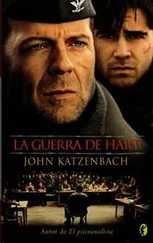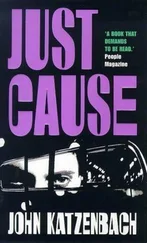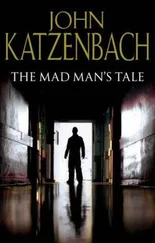“They have been deeply estranged, and she turned her back on him some time ago. Now, perhaps, with my assistance, and the blessing of the Lord, the chance of a reconciliation in his old age…”
“That would be nice, father. I hope so. Still, she should be listed.”
“I will tell her that,” he said.
“He probably needs her…”
“Bless you, child,” Ricky said. He was actually enjoying the hypocrisy of his words and his tale, in the same way that a performer enjoys those moments onstage. Moments filled with a little tension, some doubt, but energized by the audience. After so many years spent behind the couch keeping quiet about most things, Ricky actually found himself eager to be out in the world and lying.
“It doesn’t appear that there is much time for a reconciliation, father. I’m afraid Mr. Tyson is in the hospice section,” she said. “I’m sorry, father.”
“He is…”
“Terminal.”
“Then perhaps my timing is better than I hoped. Perhaps I can give him some comfort in his final days…”
The receptionist nodded. She pointed to a schematic drawing of the hospital. “This is where you want to go. The nurse on duty there will help you out.”
Ricky made his way through the warren of corridors, seeming to descend into worlds that were increasingly cold and bland. It was as if, to his eyes, everything in the hospital was slightly frayed. It reminded him of the distinctions between the button-down, expensive clothing stores of Manhattan, that he knew from his days as a psychoanalyst, and the secondhand, Salvation Army world that he knew as the janitor in New Hampshire. In the VA Hospital, nothing was new, nothing was modern, nothing looked as if it worked quite the way it was supposed to, everything looked as if it had been used several times before. Even the white paint on the cinder-block walls was faded and yellowed. It was a curious thing, he thought, to be moving through the midst of a place that should have been dedicated to cleanliness and science, and get the sensation that he would need to shower. The underclass of medicine, he thought. And, as he passed the cardiac care units and the pulmonary care units and past a locked door that was labeled psychiatry, things seemed to grow increasingly decrepit and worn, until he reached the final stage, a set of double doors, with the words hospice unit stenciled on them. The person who had done the lettering had placed the words slightly askew, one on each door, so that they failed to line up properly.
The clerical collar and suit did their job impeccably, Ricky noted. No one asked him for identification, no one seemed to think he was out of place in the slightest. As he entered the unit, he spotted a nursing station, and he approached the desk. The nurse on duty, a large, black woman, looked up and said, “Ah, father, they called me and told me you were coming down. Room 300 for Mr. Tyson. First bed by the door…”
“Thank you,” Ricky said. “I wonder if you could tell me what he’s suffering from…”
The nurse dutifully handed Ricky a medical chart. Lung cancer. Not much time and most of it painful. He felt little sympathy.
Under the guise of being helpful, Ricky thought, hospitals do much to degrade. That was certainly the case for Calvin Tyson, who was hooked up to a number of machines, and rested uncomfortably on the bed, propped up, staring at an old television set hung between his bed and his neighbor’s. The set was tuned to a soap opera, but the sound was off. The picture was fuzzy, as well.
Tyson was emaciated, almost skeletal. He wore an oxygen mask that hung from his neck, occasionally lifting it to help him breathe. His nose was tinged with the unmistakable blue of emphysema, and his scrawny, naked legs stretched out on the bed like sticks and branches knocked from a tree by a storm, littering the roadway. The man in the bed next to him was much the same, and the two men wheezed in a duet of agony. Tyson turned as Ricky entered, just shifting his head.
“I don’t want to talk to no priest,” he choked out.
Ricky smiled. Not pleasantly. “But this priest wants to speak to you.”
“I want to be left alone,” Tyson said.
Ricky surveyed the man lying on the bed. “From the looks of things,” he said briskly, “you’re going to be all alone for eternity in not too long.”
Tyson struggled to shake his head. “Don’t need no religion, not anymore.”
“And I’m not going to try any,” Ricky replied. “At least not like what you think.”
Ricky paused, making certain that the door was shut behind him. He saw that there was a set of earphones dangling over the bed corner, for listening to the television. He walked around the end of the bed, and stared at Tyson’s roommate. The man seemed just as badly off, but looked at Ricky with a detached expectancy. Ricky pointed at the headphones by his bed. “You want to put those on, so I can speak with your neighbor privately?” he asked, but in reality demanded. The man shrugged, and slipped them onto his ears with some difficulty.
“Good,” Ricky said, turning back to Tyson. “You know who sent me?” he asked.
“Got no idea,” Tyson croaked. “Ain’t nobody left that cares about me.”
“You’re wrong about that,” Ricky answered back. “Dead wrong.”
Ricky moved in close, bending over the dying man, and whispered coldly, “So, old man, tell me the truth: How many times did you fuck your daughter before she ran away for good?”
The old man’s eyes widened in surprise and he shifted about in his bed. He put up a bony hand, waving it in the small space between Ricky and his sunken chest, as if he could thrust the question away, but was far too weak to do so. He coughed and choked and swallowed hard, before responding, “What sort of priest are you?”
“A priest of memory,” Ricky answered.
“What you mean by that?” The man’s words were rushed and panicked. His eyes darted about the room, as if searching for someone to help him.
Ricky paused, before he answered. He looked down at Calvin Tyson, squirming in his bed, suddenly terrified, and tried to guess whether Tyson was scared of Ricky, or of the history that Ricky seemed to know about. He suspected that the man had spent years alone with the knowledge of what he’d done, and even if it had been suspected by school authorities, neighbors, and his wife, still he’d probably deluded himself into imagining it was a secret only he and his dead daughter shared.
Ricky, with his provocative question, must have seemed to him to be some sort of deathly apparition. He saw the man’s hand start to reach for a button on a wire hanging over the headboard, and he knew that was the nurse call button. He bent over Tyson and pushed the device out of his grasp. “We’re not going to need that,” he said. “This is going to be a private conversation.” The old man’s hand dropped to the bed and he grasped at the oxygen mask, sucking in deep draughts of enriched air, his eyes still wide in fear. The mask was old-fashioned, green, and covered the nose and mouth with an opaque plastic. In a more modern facility, Tyson would have been given a smaller unit that clipped beneath his nostrils. But the VA hospital was the sort of place where old equipment was sent to be used up before being discarded, more or less like many of the men occupying the beds. Ricky pulled the oxygen mask away from Tyson’s face.
“Who you be?” the man demanded, fearful. He had a voice filled with the locutions of the South. Ricky thought there was something childlike in the terror that filled his eyes.
“I’m a man with some questions,” Ricky said. “I’m a man searching for some answers. Now, this can go hard or easy, depending on you, old man.”
Читать дальше












